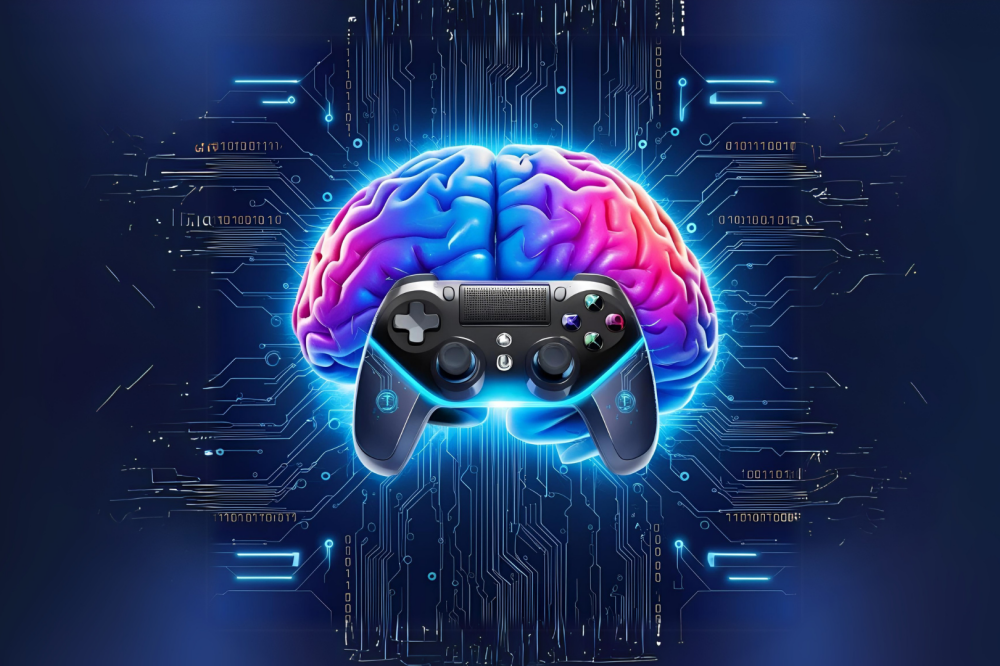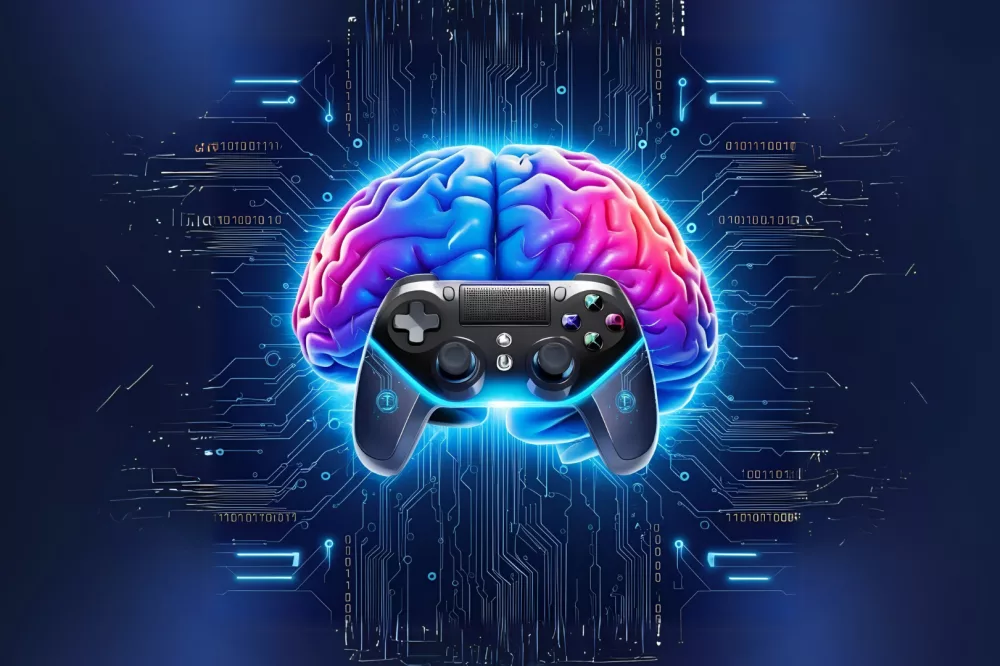
While fun is at the heart of gaming, it’s got quite a few effects on how our brain works. First off, it can do wonders for our cognitive skills like memory, attention and problem-solving. Even different genres can be of benefit to different parts of your brain. For instance, action games might sharpen quick-thinking skills, while puzzle games could boost your memory.
There’s more to gaming than just the adrenaline rush. Studies suggest it might even give your IQ a bit of a lift and playing certain games like those that focus on problem-solving could help your reasoning skills. It’s kind of like a mental workout. But before you start stocking up on gaming equipment, remember: balance is key.
It’s important to keep in mind that excessive gaming can have its downsides. While a moderate amount might enhance cognitive performance, spending too much time could also dull these abilities.
Enjoy your games, let them challenge your brain, but keep an eye on the clock. Like all things, moderation is your best friend. Gaming is an incredible medium, a complex blend of art and science, and when handled carefully, it can be more than just entertainment—it could be a tool for learning and growth.
Long-Term Brain Function: The Impact of Gaming
Gaming and your brain go way beyond just a quick thrill. When you’re spending those long hours with a controller in hand, your brain starts to show some pretty interesting changes. These changes can start to manifest with changes to the brain’s plasticity. In other words, the brain is able to adapt quickly by assigning its different regions to different tasks like decision-making, suggesting that your brain can evolve and learn depending on the situation.
But here’s where it gets tricky. While gaming keeps things flexible up there, excessive indulgence can skew the balance. Imagine repeating the same task over and over. Eventually, it might just wear you out. The same goes for the brain. Prolonged sessions can disrupt its normal function, throwing cognitive abilities like attention and memory out the window.
And what about cognitive decline? While not necessarily proven, video games might slow down the aging brain’s decline. This sounds promising, but it’s not a free pass to keep at it for hours on end. Use games as a supplement to healthy living, not as a substitute.
So, gaming’s effects are a bit of a mixed bag. When embraced with moderation and caution, your brain stays happy and healthy, and who wouldn’t want that? It’s up to you to hit that power button with purpose and reason.
The Line Between Gaming and Addiction
It’s true that gaming can be super engaging, sometimes even a bit too engaging. But where does it stop being a fun pass-time and start being a problem? It’s all about the hours. Experts suggest that playing more than 3 to 4 hours daily might signal a red flag.
Excessive gaming and addiction share a strong bond with psychological consequences like withdrawal, mood swings, or even reduced interest in non-gaming activities. Your brain gets used to the dopamine rush from constant gaming, almost like it’s on a sugar high, making it tough to let go.
When you find yourself glued to the screen, it might tweak your brain function and behavior in ways you won’t expect. Decision-making might be negatively impacted, and impulsivity could become frequent.
A healthy approach to gaming is all about balance. Engage in different activities, set time limits, and avoid making gaming the sole focus of your downtime. A mix of hobbies can go a long way in keeping your mental and emotional health in check. It’s like having a balanced diet, only for your brain.
Mental Health and Well-Being in Gamers
Gaming can be a great way to unwind and shake off some stress after a busy day. The worlds we dive into offer a form of escape where we can relax and de-stress. Yet, there’s a flip side. Lengthy gaming sessions can creep up on your mental health, potentially nudging you towards anxiety or even depression in some cases.
The online aspect can be a double-edged sword. On one hand, there’s a community with shared adventures and camaraderie. But too much screen time can lead to feeling disconnected from the real world, inviting social isolation.
Keeping a balanced relationship with gaming involves nurturing your mental well-being. Mix in some offline activities that make you feel good, whether it’s going for a walk, reading a book, or just spending time with friends in person. It’s these small, mindful choices that keep the gaming experience positive.
Gaming is a great tool to help you relax. Just remember to hit pause on the controller and take care of yourself. Stay centered by blending gaming with everyday life to keep both your mental and emotional health in check.
Video Games, Attention, & Memory Research
Video Games & Impulsivity Research
About Julianne
Julianne is the founder and writer for the blog articles here on Power Player Zone – a nurturing online space for gamers to learn more about their passion, no matter their background or identity. As an introverted female gamer for the past 5 years, Julianne strives for inclusivity in her mission to spread the joy of video games to everyone; for her, games aren’t just for fun – they allow us to gain insight into ourselves and the vibrant cultures and communities in which we live.


This was a great and eye-opening article to read. I have a daughter that gets into gaming way too much. I try to explain to her what excessive gaming does to her brain but she is a teenager – she thinks I am stupid and I have no idea what I am talking about. It gets so frustrating. I am on the fence of trying harder and giving up. Have you ever dealt with this in your personal life? What do you think could help not only the gamer, but the family members of that individual in situations like this?
Hi Courtney, thanks for your questions!
I guess I can relate a lot to your daughter because I’m an avid gamer myself and approaching my early 20’s; I’ve only just learned how to tell myself that enough is enough when I’ve spent a bit too much time with the controller. I think it’s important to encourage a gamer and their family members to consider the specific aspects of gaming that draws the gamer in that little bit more; everyone will hopefully be able to start on the same page from here.
For me, I’m an avid gamer because it helps me to understand the characters that I play as. Once identifying this, I’ve been able to put in place healthy mindsets to stop me from over-indulging in this, e.g. reminding myself that these characters are fictional and while understanding them through gaming may help my social skills in the real world, getting too attached to them (and thus gaming) may lead me to develop unhealthy parasocial relationships with these characters – hindering my ability to socialise at all. Another way I’ve formed a healthy mindset is to understand that the struggles that game characters go through is likely mirroring what someone in the real world might be going through too. In this way, gaming then becomes thought-provoking and a source of comfort rather than a dead-set necessity.
Such healthy mindsets can then form the foundations for practical compromises like setting boundaries. Begin small when first doing this, and in keeping with the theme of gamers and their family members staying on the same page, try to set these boundaries together. For example, 5 hours a day (if the gamer already does this) for a week, then 4 hours a day the next week, and so forth until you notice they’re automatically and consistently keeping in line with a new healthy habit.
With all that said though, success in executing all this requires a lot of patience, especially when you find that anything you say to the gamer initially gets dismissed – which would call for you to wait a while before trying again. I’ve realised that this process I’ve described has occurred as a repeating cycle between my family and I until I was able to understand the good that it would do for me. I’m indeed very thankful that my parents were patient with me. It may take some time, and as your daughter gets older, hopefully she’ll come to appreciate the effort you’re putting in with looking after her health and wellbeing.
Hope this helps!
Hello Julianne!
This was such an interesting read! It’s fascinating how long gaming sessions can have both positive and negative effects on brain function. I’ve definitely experienced that feeling of deep focus and problem-solving when playing games like Skyrim, but I’ve also had moments where I realized I’d been playing for way longer than I intended! It’s a fine balance between enjoying the mental engagement and knowing when to step away.
I really appreciate the discussion on cognitive benefits like improved reaction time and strategic thinking. But I’m curious—do you think certain game genres have a more positive impact on brain function than others? For example, would puzzle or strategy games be more beneficial compared to high-action games that might lead to more fatigue?
Angela M 🙂
Hi Angela, thank you so much for your input! I’m mostly an action and platformer type of gamer who usually plays the Sonic games, but I do enjoy cozy games like Hello Kitty Island Adventure with its sessions of puzzle-solving and strategy quests!
I think it’s hard to definitely say whether certain genres have more of a positive impact on brain function than others. As a psychology student, I’ve read a lot about researchers suggesting that regardless of the nature of a hobby or aspect of the environment one interacts with, it tends to have benefits for your mental health, wellbeing, and brain so long as you utterly enjoy what you’re doing – and I think this also applies with video games.
I have friends who hate the idea of playing Sonic games because they find getting through the levels to be really frustrating (meaning they would become fatigued more easily and quickly), and would much rather take on the cognitive demands of problem- and puzzle-solving in cozy games like Hello Kitty.
So yes, from what I’ve observed, a gamer truly has to enjoy the types of games they play before any positive effects on the brain can happen, and I think games of all genres can be good for the brain in their own ways.